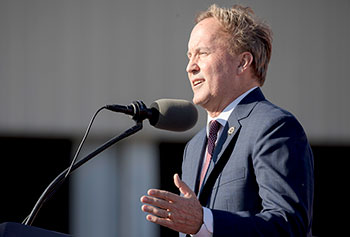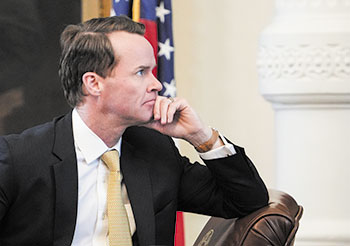With numerous bills targeting the LGBTQ community under consideration in the Legislature this year, advocates have rallied at the Capitol several times during the legislative session. (Photo by Tammye Nash)
More bills that harm LGBTQ community are still in play as the 2023 Legislature winds down
DAVID TAFFET | Senior Staff Writer
taffet@dallasvoice.com
and
TAMMYE NASH | Managing Editor
nash@dallasvoice.com
A ban on transgender healthcare for adolescents and a measure preempting local ordinances have passed both chambers of the Texas Legislature and have been sent to Gov. Greg Abbott’s desk to await his signature.
Other bills targeting the LGBTQ community have been approved by at least one chamber of the legislature, but their final outcome remained in limbo as Dallas Voice’s deadline approached this week.
House Bill 2127
While a law preempting local ordinances may not seem like an LGBTQ issue, House Bill 2127 is actually a way for anti-gay officials at the state level to preempt city and county nondiscrimination ordinances protecting LGBTQ people. Both Dallas County and the city of Dallas have passed such laws.
Dallas County is the only county in Texas to have passed a nondiscrimination law.
The city of Dallas may have unique grounds to challenge the bill once Abbott has signed it into law because the city’s nondiscrimination law was voted into the city charter rather than standing just as an ordinance passed by city council.
Senate Bill 14
Senate Bill 14, the ban on gender affirming healthcare for transgender minors, forbids doctors from prescribing hormones or hormone blockers to teens under the age of 18 for gender-affirming care. Such care is backed by the World Health Organization and all medical, psychiatric and social work organizations.
A number of legal organizations are preparing to file legal challenges to SB 14 as soon as it’s signed into law. Lambda Legal has filed suit against similar legislation in at least six states already.
In limbo
SB 15 expands a ban already in place on transgender students competing in public school sports based on their actual gender identity, requiring them to instead compete based on their gender assigned at birth. SB 15 expands that ban to affect transgender students in public colleges and universities in Texas.
SB 15 expands the current ban on trans youth participating in sports to include trans athletes participating in college and university sports. The bill directs the Higher Education Coordinating Board to enforce the rule. According to Angela Hale of Texas Competes, the agency has never regulated college sports.

Attorney General Ken Paxton
Both houses have passed similar bills. It’s now sitting in the Senate that can either pass the House version or send it to committee to reconcile.
SB 12, which in its original form prohibited any drag performance that might be seen by a minor, created fines and criminal penalties for businesses hosting such performances and the entertainers participating in them. It was passed in its original form in the Senate, but the Texas House actually approved a committee substitute version that does not include language specifically targeting drag performances and drag queens.
At deadline, that version had been sent to the Senate which could approve the amended version, reject the amended version and re-insert anti-drag language thus sending the measure to conference committee or take no action and let it die.
SB 17 bans diversity, equity and inclusion programs in public universities. Similar bills passed both chambers are now sitting in the Senate to concur with the House version or go to committee to reconcile.
HB 900 restricts access to “obscenity” in school libraries with a broad definition of obscenity that will ban most books with LGBTQ references or characters. On Wednesday evening, it passed the Senate and is on its way to the governor..
HB 890 includes “don’t say gay” language that restricts instruction or discussion of sexual orientation and gender identity. The bill passed the Senate with amendments and goes back to the House.

Speaker of the House Dade Phelan
In a related education bill working its way through the Senate, teacher pay raises that previously passed now have been tied to school vouchers in amendments to the bill. School vouchers are unpopular with the public and have already been shot down in the House of Representatives, but they are a pet priority for Abbott, who has threatened to keep calling special sessions until the bill passes.
A bill requiring the Ten Commandments be posted in public school classrooms, however, has failed. But lawmakers passed a bill allowing schools to employ chaplains in addition to school counselors, without requiring any special training or checks for those chaplains.
SB 559 would allow lawyers to refuse services based on their religious beliefs. The bill passed the Senate and is awaiting House approval.
Bills to address gun violence have failed. SB 23 would have raised the minimum sentence for gun crimes. HB 2744 would have raised the age to buy a semiautomatic weapon from 18 to 21.
The legislative session ends on Monday, May 29. The governor may call a special session and, if so, he gets to set the agenda for what can and cannot be considered during the four-week session. If a budget isn’t agreed to before the Legislature closes, a special session must be called.
Hello Pot? Kettle here…
Texas Attorney General Ken Paxton this week called for the resignation of Speaker of the House Dade Phelan for allegedly presiding over the House in what appeared to be an inebriated state, chastising Phelan for such an ethical shortcoming.
Paxton’s call for Phelan to resign came the same day that it became known publicly that a House committee had, in March, secretly authorized an investigation into allegations of years of misconduct and ethical failings by the attorney general.
The House General Investigating Committee members heard testimony on Wednesday morning for investigators who said they believe Paxton broke a number of state laws by misusing office funds and his power to benefit a donor. But it was Paxton’s efforts to use $3.3 million in public funds to settle a lawsuit brought by whistleblowers who were fired after accusing the attorney general of accepting bribes.
Paxton agreed to the settlement, investigators charged, so he could avoid having to testify about the bribery charges in court.
To pay the settlement, the House would have had to include the payment in the budget, which lawmakers refused to do.
These charges are in addition to securities fraud allegations that have been pending against Paxton since 2015. Paxton has pleaded not guilty in the case, but the trial has been delayed by changes in venue and pre-trial motions. The allegations of bribery and abuse of office are also under investigation by the U.S. Department of Justice.


